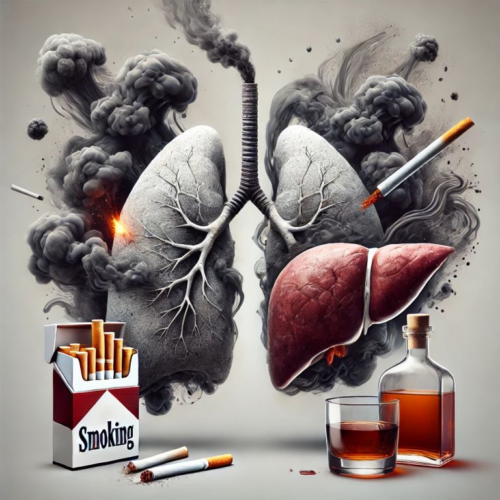Alcohol Consumption and Smoking – The Facts
Alcohol drinking has been misconceived as a popular means of socialization, celebration, and relaxation. A vast proportion of alcohol consumers intakes it to cope with emotional and mental struggles such as anxiety and depression, to reduce stress, to overcome social anxiety, and to enhance pleasure.
Mild to moderate and occasional alcohol consumption is considered safe for most people. However, some may need to abstain from alcohol entirely due to existing or probable health risks. According to the Centers for Disease Control and Prevention (CDC), moderate drinking involves one drink per day for women and up to two drinks for men. However, since the ill effects of alcohol outweigh the potential benefits, it is highly recommended to keep oneself distant from alcohol.
Contrary to the minor health benefits associated with moderate alcohol consumption, any level of smoking is considered to be highly unsafe for health, and even light or social smoking carries significant risks. Moreover, smoking poses significant health issues to those exposed to the smoke, known as passive smoking.
- According to the World Health Organization (WHO), approximately 2.3 billion people worldwide drink alcohol.
- A 2020 WHO estimate reveals that around 1.3 billion people globally are smokers.
Source: https://www.who.int/data/gho
Risks of excessive alcohol consumption and smoking
Excessive alcohol consumption and smoking can be detrimental to health and often lead to chronic, life-threatening conditions. Alcohol can bring about heart problems, liver diseases like liver cirrhosis, digestive issues, reproductive health problems including erection and ejaculation issues, and carries a high risk of cancers.
Smoking is a prominent cause of lung and heart diseases, stroke, and several types of cancer, including lung cancer. Both alcohol and smoking deteriorate mental and emotional health, leading to anxiety, depression, manias, and cognitive impairment. Relationship issues, social isolation and status degradation, financial losses, and productivity declines accompany the initial health issues, further degrading the overall quality of life.
Furthermore, individuals struggling with alcohol or smoking addiction may experience heightened emotional distress, leading to a greater likelihood of suicidal thoughts. Additionally, alcoholic addiction induces harmful and destructive emotions leading to self-injury, hazardous social behavior leading to crimes, and antisocial activities.
Passive Smoking
Smoke emanating from the smoker poses severe risks to those nearby, known as passive smoking. These non-smokers, particularly children, pregnant women, and the elderly, are highly vulnerable to the harmful chemicals in secondhand smoke. Passive smoking can cause respiratory infections, asthma, heart disease, and even lung cancer. Passive smoking pregnant women are more susceptible to delivering babies with low birth weight or developmental issues. Children who are affected by passive smoking may develop respiratory infections and heart health issues. Adults who inhale secondhand smoke can have cardiovascular and respiratory health issues, making passive smoking a significant public health concern.
Abstaining, Moderation, or Quitting
If not entirely abstaining, moderation or quitting alcohol and smoking is necessary to reduce the risks of cognitive degradation, chronic diseases, and premature death and to improve overall well-being. Falling into addiction can be the main threat involved in alcohol consumption and smoking. This risk can be mitigated by moderation, and subsequent quitting helps the body and mind recover from the damage caused by harmful substances. Self-support, awareness, and courage are necessary to keep oneself away from alcohol and smoking. For addicted people, a combination of behavioral therapy, medical interventions, and lifestyle changes may be required to overcome addiction and start a healthy life.
The Global Alcoholic Beverages Industry: A Catalyst for Unhealthy Drinking Habits
The growing global alcoholic beverages industry is undoubtedly contributing to the rise in unhealthy drinking habits and addictions worldwide. Corporations often utilize aggressive marketing strategies targeting vulnerable populations, including youth and individuals suffering from psychological and social issues. Alcohol has become a symbol of social status, pleasure, and relaxation, glorified by advertising and entertainment media, creating the delusion of false benefits while understating the potential risks.
Apart from traditional drinks, alcohol comes in many forms, such as energy drinks and flavored spirits. Coupled with this, the visible availability of alcohol products through the more comprehensive supply chain network and retail outlets, including convenience stores, supermarkets, and online retailers, has widened access to alcohol. The net result is undermining the difference between responsible and excessive consumption and ending up in serious issues related to addiction, health, relationships, potency, and finances.
Statistics on the Global Alcohol and Beverages Industry and Unhealthy Drinking
- Industry growth: The global alcoholic and beverages market is projected to reach US$ 1,963.1 billion by 2032 from US$ 1,579.1 billion in 2023, thus recording a CAGR of 2.4% during 2024 – 2032. (Source: IMARC Group)
- Alcohol-related deaths: Alcohol poses a significant life-threatening challenge, causing a range of diseases and injuries. Approximately 3 million deaths are reported annually connected to alcohol abuse and addiction. Approximately 7.3% of the global adult population suffers from alcohol use disorders. (Source: World Health Organization – WHO)
- Alcohol-related suicide: Individuals who have addictions to alcohol exhibit a high tendency for self-injury and suicide. Globally, those with alcohol dependence have suicidal tendency risks that are approximately ten times higher than those without alcohol dependence. (Source: Our World in Data, WHO)
- Alcohol-related crimes: Alcoholism and related adverse emotional conditions enable people with an addiction to commit crimes and exhibit anti-social behavior. Domestic violence, sexual assault, and road traffic accidents prevail in such societies, affecting the general public. In 2019, 156,000 deaths from alcohol-related road crashes were reported. (Source: WHO). Additionally, alcohol has proven to be a leading factor in violent crimes such as intimate partner violence and other violent behaviors. (Source: WHO)
The Global Tobacco Industry: A Catalyst for Unhealthy Habits and Addiction
Next to the alcoholic beverages industry, the global tobacco industry is proving to be responsible for the rise of unhealthy smoking habits and addictions worldwide. Corporations and regional tobacco companies use multichannel marketing strategies utilizing celebrities and heroes to associate smoking with social status, masculinity, pleasure, and relaxation, deliberatively undermining the dangers and risks associated with smoking. Furthermore, easy accessibility and normalization of smoking have created a broad consumer base, entrapping billions into addiction and leading to serious health issues and mortality.
The tobacco industry has been thriving in utilizing technology to invent, market, and sell more sophisticated tobacco products, such as electronic cigarettes, along with traditional cigarettes. The easy availability of smoking products through retailers and online stores has boosted smoking habits, leading to addiction and a range of health risks. Moreover, the normalization of smoking in culture and society through media and role modeling has created generations of addicted individuals who are ignorant or desensitized to the dangers of tobacco and smoking.
Statistics on the Global Tobacco Industry and Unhealthy Habits
- Global tobacco consumption: Approximately 1.3 billion people worldwide are smokers. (Source: WHO)
- Tobacco-related deaths: Tobacco directly or indirectly causes approximately 8 million deaths annually. (Source: WHO)
- Youth smoking: Tobacco-related marketing campaigns often target the youth, inflicting smoking initiation, addiction, and related health issues. Source: WHO)
- Tobacco industry influence: Reports indicate the impact of tobacco companies on public health policies and regulations. (Source: WHO)
Societal and Economic Impact of Alcohol and Smoking
Impact on Individuals
The negative impact of alcohol and smoking extends beyond personal health and well-being issues but has imparted considerable financial and emotional burdens on individuals, families, communities, and nations. Addicted individuals often face diminished productivity, increased medical expenses, low self-esteem, downgraded social reputation, and impaired physical, mental, and emotional health. Moreover, increased suicidal tendencies resulting from psychological distress can result in infliction of self-damage and other disasters for the addicted members as well as their families.
Impact on Families
The consequences of addiction extend beyond the individual to have a significant impact on families. They often face increased medical expenses, emotional stress, loss of income, productivity loss, declined esteem and social reputation, and premature deaths. Moreover, the toxic domestic atmosphere caused by addiction’s adverse psychosocial effects inflicts psychological trauma on other family members, hindering their growth and development.
Impact on Communities
Alcohol and smoking addictions severely impact communities through elevated healthcare costs, increased demand for social services, and heightened social rehabilitation responsibilities. Healthcare and care facilities, including hospitals, addiction centers, and community programs, need to overstrain to treat and support those afflicted by alcohol and smoking-related diseases such as liver cirrhosis, cancer, tuberculosis, and other respiratory diseases. Additionally, substance abuse can lead to increased crime rates, and the state and law enforcement mechanisms need to bear the extra burden of law enforcement and rehabilitation programs.
Impact on Nations
States and nations yield many financial benefits from taxes and excise duties levied on alcohol and tobacco products. Still, on the other side, staggering losses are incurred due to the evil impact of alcohol and smoking addictions. According to the World Health Organization (WHO), the total financial burden imposed on the world economy due to smoking-related issues is estimated at over USD 1.4 trillion annually. This includes the direct costs associated with smoking, such as healthcare expenses for treating smoking-related matters, as well as the indirect costs, such as impaired productivity due to illness or premature death. Excessive alcohol consumption is producing catastrophic damage to nations, causing 3 million deaths worldwide each year, burdening public health systems, and degrading national economic output. Administrations must allocate resources heavily for awareness, prevention, treatment, and law enforcement, redesigning resources from other essential services. Overall, the societal and economic impact of alcohol and smoking is alarmingly immense, affecting society as a whole, from individuals to nations.
Initiatives Needed at Personal, Family, and Social Levels to Address Alcohol and Smoking Issues
A multi-faceted approach is essential for addressing the widespread issues of alcohol consumption and smoking. Personal responsibility, self-awareness, and self-care are needed to make oneself health-conscious and recognize the evil impact of these substances on one’s health and life. Without reluctance or hesitation, one should seek external help to overcome addictions once the ill effects start emanating, negatively affecting health, well-being, and other areas. Healthcare professionals, addiction specialists, or support groups can effectively address the addict’s issues and offer specialized support and care to them to overcome addictions through goal setting, moderation, and eventually quitting.
The role of families in supporting their loved ones to overcome addiction and quitting alcohol and smoking is crucial. Family members should develop awareness about the risks associated with alcohol and smoking, as well as how to aid recovery. By fostering a supportive environment filled with sharing and caring, encouraging healthy habits, and avoiding conflicts and unrest, families can act as a haven for those who need love, compassion, and reassurance. Such individuals are most likely to safeguard their and their families’ general interest in health and well-being by completely abstaining from any negative habits, including alcohol and smoking.
On a larger scale, social initiatives and interventions are indispensable for addressing these issues. Public health campaigns reaching every class of society and raising awareness about the dangers of alcohol and smoking are essential. States and administrations need to enforce stricter regulations on advertising, access, and consumption of alcohol and tobacco products. Local bodies should take the initiative to conduct community programs to educate, support cessation, and provide counseling for the people with an addiction as well as the vulnerable ones. With a collective effort, it is possible to influence individuals to make healthy choices, thus promoting an environment that prioritizes well-being over addictions and suffering.
Final Thoughts
Alcohol and smoking issues constitute a significant threat to every unit of society, from individuals to families and communities to nations. Apart from the devastating health and productivity issues, addictions transform individuals into patients, criminals, impotent, and liabilities to families and society. Sadly, the corporations and companies in this industry have more profound influence and significant control over governments, political parties, and markets. To combat this threat, collective initiatives and efforts are needed from all classes of society, including social reformers, influencers, government agencies, NGOs, non-profits, healthcare groups, media, religions, and ordinary people. Political, scientific, and spiritual strategies need to be devised and implemented to tackle this menace to free the existing generations from the tenacious and vicious grip of alcohol and smoking and to craft future generations that are healthy, productive, and progressive.




